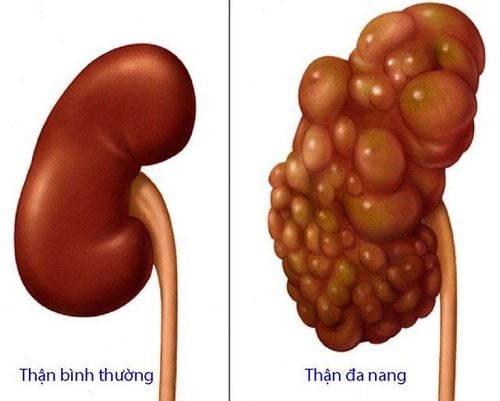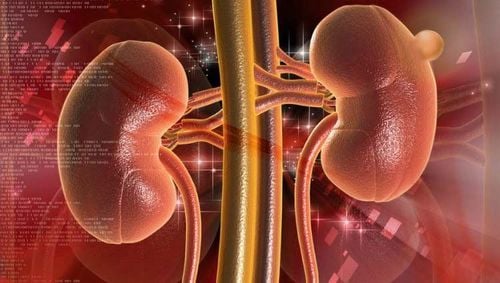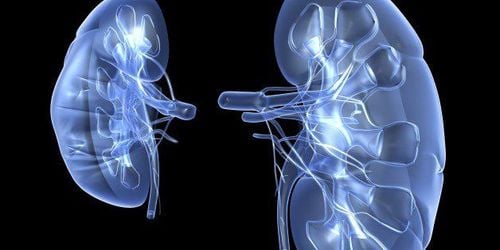This is an automatically translated article.
Polycystic kidney disease is one of the most common kidney diseases. The disease has a genetic cause, an estimated 12.5 million people worldwide are suffering from this disease. Therefore, early detection is essential to avoid kidney failure.
1. What is polycystic kidney disease?
Polycystic kidney disease is a type of kidney damage caused by the appearance of many fluid-filled cysts in the renal parenchyma and these are benign fluid cysts. In most cases, these cysts usually appear only in the kidney, but in some patients, there may be fluid cysts outside the kidney such as liver and pancreas cysts, and especially in the brain and heart.

Hình ảnh thận bình thường và thận đa nang
2. Why do kidney cysts appear?
The cause of polycystic kidney disease is genetic abnormalities. There are two types of genetic abnormalities that cause polycystic kidney disease:
The first type: is due to autosomal dominant abnormalities. This type accounts for approximately 90% of all people with polycystic kidney disease and if one parent has it. 50% of babies are born with polycystic kidney disease. Polycystic kidney disease due to this cause usually appears in adults between the ages of 30 and 40, but children can also develop this type of polycystic kidney. The second type is the autosomal recessive type. This type is very rare and usually manifests soon after the baby is born. A small part of the disease may appear later in older children and adolescents. The disease only appears in children if both parents carry the disease gene and there will be about 25% of children affected.
3. Manifestations of polycystic kidney disease
Usually, cysts in the kidney progress silently and are not detected early until complications such as kidney failure, high blood pressure (hypertension)... Some cases are discovered by chance during ultrasound. Periodic health checkup.
Manifestations of polycystic kidney disease can be hypertension, pain in the lumbar fossa with features such as dull pain or severe cramping pain on one or both sides, headache, fatigue, frequent urination or blood in the urine, can be with kidney stones and urinary tract infections. There are cases where the patient feels the abdomen is enlarged and a mass is palpable next to the navel (due to the large kidney). The late stage is the stage of kidney failure because the cysts develop, causing severe compression and damage to the renal parenchyma.

Đau vùng hố thắt lưng với các tính chất như đau âm ỉ hoặc đau quặn dữ dội một hoặc hai bên là biểu hiện của bệnh thận đa nang
Although these cysts are benign in nature, they have the potential to cause kidney damage which leads to many complications such as hypertension. High blood pressure can cause cerebral hemorrhage, aortic aneurysm, myocardial infarction, damage to the fundus ... and kidney damage creating a pathological spiral. Studies show that up to 50% of patients with polycystic kidney disease develop kidney failure by the age of 60.
Kidney failure further increases blood pressure and increases the risk of heart attack and stroke. In people with polycystic kidney disease, the risk of developing liver cysts is also common and this risk increases with age. The risk of liver cysts is similar in men and women with polycystic kidney disease, but in women the cysts are usually larger in size and this is thought to be related to female sex hormones. .
Patients with polycystic kidney also have a high risk of developing an aneurysm in the brain and this is really dangerous. Women with polycystic kidney disease can still have a safe pregnancy and delivery but need to be alert to certain risks such as hypertension, gestational toxicity, preeclampsia and eclampsia that may be increased by polycystic kidney disease. . Besides, a number of abnormalities may also be associated with polycystic kidney such as colonic diverticulum, heart valve damage... worsening the disease.
Detecting polycystic kidney disease is not difficult by means of imaging diagnostics such as abdominal ultrasound, tomography, abdominal magnetic resonance imaging. Doctors recommend that you go for a kidney function test if you suspect kidney abnormalities
Vinmec international general hospital system has applied a very modern urine test technique to evaluate kidney diseases. grand. L-FABP technique allows early diagnosis of renal failure. Up to now, Vinmec is the first place in Vietnam to apply this test according to Japanese technology on a modern automatic AU680 testing machine, giving quick and accurate results.
Urine test technique to screen for early kidney failure is applied in the following cases:
Kidney failure screening for health examination program or mass screening if the doctor or patient has suspicion of kidney function. Screening for kidney failure for patients with diabetes, high blood pressure, Patients with kidney diseases: acute and chronic glomerulonephritis, nephrolithiasis, pyelonephritis, polycystic kidney, horseshoe kidney , Monitoring patients before and after kidney transplantation Patients in the intensive care unit undergoing surgery Patients with sepsis Being assigned to take X-rays using iodinated contrast...
Please dial HOTLINE for more information or register for an appointment HERE. Download MyVinmec app to make appointments faster and to manage your bookings easily.













